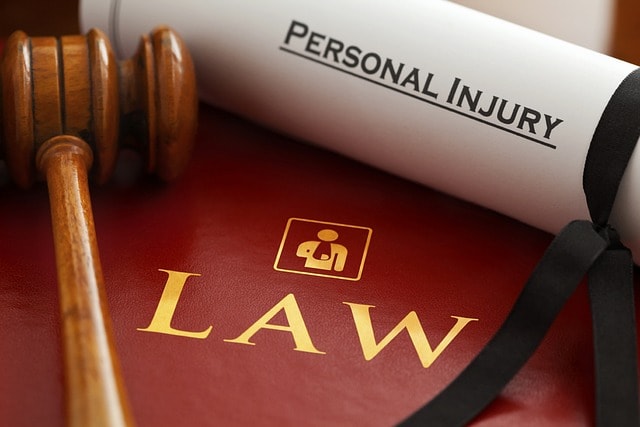Helping Clients Recover Financially from Serious Injuries

If you suffered injuries or lost a loved one in a preventable accident that was not your fault in Chicago, you have our deepest sympathies. Taking legal action can not only bring closure after an accident; it can give you the financial help you need to move on with your life. If your accident was caused by someone else's negligence or recklessness, you likely have options for seeking compensation. However, you need an experienced injury attorney in Chicago for help.
The Chicago personal injury attorneys at DJC Law are here for you. You can turn to our dedicated legal team to review your claim at no cost, answer your questions, and offer advice on your rights and options for pursuing compensation. We'll help by investigating the incident to uncover evidence that backs up your version of events. We'll then defend you in negotiations or in court if necessary.
If you have a valid claim, you can trust that we will do all we can to build a strong case and increase your chances of getting the full and fair compensation you deserve. With an astonishing 99% win rate at trial, we are the team of attorneys you want behind you. We have helped countless clients with personal injury cases, and we'll apply that knowledge and experience to your unique situation. Call (888) 853-8169 to schedule your free consultation with our personal injury law team today.
Why Should I Choose DJC Law To Handle My Chicago Personal Injury Claim?

DJC Law is renowned nationally as one of the premier personal injury law firms in the country, boasting a collective legal experience of over 200 years among its top-tier personal injury attorneys. Led by the esteemed Dan Christensen, a board-certified personal injury trial lawyer, our firm stands out in the legal community.
Dan has been lauded by numerous prestigious legal entities, including Martindale-Hubbell and the National Association of Distinguished Counsel. He is also recognized by most personal injury lawyers in America and the National Trial Lawyers Association, Illustrating his leadership in the field. Furthermore, his membership in the Multi-Million Dollar Advocates Forum and receipt of the Clients' Choice award from Avvo highlight his commitment to excellence in client service.
Under Dan's guidance, our team comprises the most experienced and best personal injury lawyers, offering unparalleled legal representation to clients in Chicago and its environs. Whether you're seeking a seasoned Chicago personal injury lawyer or the best personal injury lawyers in the area, DJC Law is equipped to provide the advocacy you need. Call us right away for your car accident, medical malpractice, workplace injury, or other personal injury case.
To date, DJC Law has recovered tens of millions of dollars in settlements and verdicts for our clients, including:
- $7 million settlement for consumer fraud
- $5.9 million recovery for a child's head injuries
- $2.9 million recovery for a pedestrian accident survivor
We have a history of securing six- and seven-figure awards for our clients.
While we can't guarantee results or how much money you could receive, we can promise to do all we can to help you obtain the maximum financial recovery possible. Call now to learn how we can help you.
What Is Your Law Firm's Approach?
When you are suffering from an injury or loss, you need a legal team you can rely on. At DJC Law, we have a unique approach that has led us to a 99% win rate in our personal injury cases.
Some major aspects of our method include:
- We pride ourselves on delivering personalized service to each client. Your needs are important to us, and you can rest assured we will take an active interest in your case.
- We foster open communication with our clients, and we will respond to your calls and emails promptly while providing regular updates as to the status of your case.
- We are tenacious and assertive negotiators and litigators. Our lawyers have gained reputations as assertive and passionate legal advocates who fight hard to help our clients achieve the favorable outcomes they expect and deserve.
- We will do all we can to increase your chances of success, and we won't rest until we've exhausted all avenues to help you get the money you need.
- We are a veteran-owned law firm, and we have a special place in our hearts for the strong men and women who have sacrificed so much in the service of our country.
Additionally, our law firm offers free consultations, and our lawyers work on contingency. You won't pay us anything upfront to represent you, and we will only collect a fee if we recover compensation for you through an insurance settlement or court award.
For dedicated, impassioned counsel to help you and your family through this difficult time and improve your odds of getting the most from your Chicago personal injury claim, contact DJC Law today for a no-cost case review.
What Practice Areas Does Your Law Firm Handle in the Chicago Area?
As a full-service personal injury law firm, DJC Law handles all injury claims resulting from someone else's negligence or wrongful conduct. When you are facing an insurance claim, personal injury lawsuit, or other injury-related matter, we'll stand by your side to get you the most favorable results possible.
Our Chicago injury lawyers are standing by to help you navigate the legal process. We'll be your staunch defenders in negotiations with the insurance provider so you get a fair settlement. If necessary, our personal injury lawyers in Chicago are ready to take your case before a judge or jury. Contact our Chicago injury law firm immediately to schedule your free case evaluation.
How Often Do Accidents Happen in Chicago?
According to accident statistics from the Illinois Department of Transportation (IDOT), the Chicago area reported the following in a recent year:
- 98,563 total traffic accidents involving nearly 200,000 vehicles
- 24,078 total traffic-related injuries
- 230 total traffic-related fatalities
Most traffic accidents occur on Friday, and more collisions occur between 4 p.m. and 8 p.m. on any given day. Distracted, aggressive, and impaired driving are the leading causes of traffic accidents in Chicago and throughout Illinois.
No matter when or where your accident occurred, you deserve help collecting maximum compensation to make a full recovery. Our legal team has helped countless accident victims get the money they need to cover medical bills, lost wages, emotional distress, loss, and more. Reach out to DJC Law immediately to get started with your injury claim.
What Are Common Injuries People Suffer In Chicago Accidents?
Accidents in Chicago, like any urban area, can lead to many injuries. The types of injuries people may suffer in Chicago accidents are diverse and can vary based on the nature of the incident. Even minor injuries can result in painful recoveries that cost you time at work and experiences you would have enjoyed if not for your accident.
Common injuries in Chicago accidents include:
- Whiplash: Common in car accidents, whiplash is an injury to the neck caused by rapid forward and backward movement, often resulting from a rear-end collision
- Broken Bones: Fractures or broken bones can occur in various accidents, including falls, car crashes, and pedestrian accidents
- Head Injuries: Head injuries can range from minor concussions to severe traumatic brain injuries (TBI) and can occur in car accidents, slips and falls, and workplace incidents
- Back Injuries: Back injuries, including herniated discs and spinal cord injuries, can result from accidents involving heavy lifting, falls, or car crashes
- Burns: Fires, explosions, or contact with hot surfaces or substances can cause burn injuries
- Soft Tissue Injuries: Sprains, strains, and contusions to soft tissues like muscles, ligaments, and tendons can happen in various accidents
- Eye Injuries: Eye injuries may occur in accidents involving flying debris, chemicals, or sharp objects
- Dental and Facial Injuries: Facial fractures, dental injuries, and jaw damage can result from accidents
- Sprains and Strains: Common in slip and fall accidents and incidents where individuals try to brace themselves during a fall
- Respiratory Injuries: Accidents involving smoke, fire, or toxic chemicals can lead to respiratory injuries
- Musculoskeletal Injuries: Musculoskeletal injuries like muscle and joint damage can result from various accidents
These injuries' severity and long-term effects can vary widely, and immediate medical attention is crucial to address them. Seeking medical care and consulting a personal injury attorney can ensure you receive proper treatment and compensation if another party's negligence caused the accident.
Our legal professionals can explain your rights and options for seeking compensation for your injuries and damages. Call our law firm for help with motorcycle accidents, wrongful death cases, car accident injuries, and other damages.
What Should I Do After An Accident In Chicago?
It's often difficult to think clearly immediately after a traumatic accident. However, your actions following an accident in Chicago can significantly affect any subsequent legal or insurance proceedings.

Here are some steps you should take:
- Ensure Safety: First and foremost, check if the accident injured you or anyone else. If so, call 911 immediately.
- Notify the Police: Regardless of the accident's severity, report it to the police. They will document the scene and create an official accident report, which you need for insurance claims or potential lawsuits.
- Document the Scene: Take photos or videos of the accident scene, including all vehicles involved, any visible injuries, and any relevant road conditions or traffic signs.
- Contact Your Insurance Company: Report the accident to your insurance company immediately. Provide them with all the necessary details and cooperate fully with their investigation.
- Consult a Lawyer: An experienced Chicago, IL, injury lawyer can guide you through the legal process and protect your rights.
Remember, every accident is unique, and these steps may not apply to every situation. Always use your best judgment and prioritize safety above all else. Once you are safe and have gotten medical treatment, please take the time to protect yourself legally by consulting with a trusted personal injury lawyer.
At DJC Law, our personal injury lawyers in Chicago, IL, offer free consultations so injury victims can get answers and hope without any financial obligation. We'll answer your questions and address your concerns so you can make the best possible decision about how to move forward after your accident. If you decide to pursue legal action, we'll be strong allies in your corner. Contact our Chicago, Illinois personal injury attorneys today.
How Can I Determine If I Have A Valid Personal Injury Claim In Chicago?
After an accident in Chicago, you may wonder whether you have a valid personal injury claim.
Several key factors determine the validity of your claim:
Establishing Negligence
You must prove that a negligent party caused your injuries. Negligence can take many forms, from a driver failing to stop at a red light to a property owner not maintaining a safe environment.
Demonstrating Damages
You must have suffered physical, emotional, or financial damages from the accident. This could include medical bills, lost wages due to time off work, pain and suffering, or damage to your vehicle or property.
Statute Of Limitations
Illinois has statutes of limitations for personal injury claims that define how long you have to bring suit against the parties that caused your injuries. The statute of limitations varies for different cases, so consult a personal injury attorney immediately for advice regarding your claim.
Comparative Fault
Illinois operates under a modified comparative fault system. This means that if you were partially at fault for the accident, your potential compensation may decrease by your percentage of fault. You may not recover compensation if you were more than 50 percent at fault.
Consult a knowledgeable Chicago personal injury attorney at DJC Law to review the specifics of your case, guide you through the legal process, and explain your rights and options.
How Long Do I Have To File A Personal Injury Lawsuit In Chicago?

In Chicago and all of Illinois, the time limit for filing a personal injury lawsuit is typically two years from the injury or the date when you discovered or have discovered the injury with reasonable diligence.
However, certain exceptions and variations may apply to the statute of limitations.
Some important considerations include:
- Discovery Rule: In some cases, an injury may not immediately manifest. The discovery rule allows the statute of limitations to start when you discovered or reasonably should have discovered the injury. This rule often applies in cases of medical malpractice or latent injuries.
- Minor Plaintiffs: If the injured party is a minor (under 18 years of age) at the time of the injury, the statute of limitations is typically tolled, meaning it doesn't begin to run until the minor turns 18. This allows the minor to file a lawsuit within the two years following their 18th birthday.
- Government Entities: If the potential defendant is a government entity or official, you may face shorter time frames to provide notice of the claim and to file a lawsuit.
- Statute of Repose: Illinois has a statute of repose for certain medical malpractice cases, which imposes an absolute time limit on when you can file a lawsuit, regardless of when you discovered the injury. The time limit is typically four years from the alleged medical malpractice or within two years of when you discovered or reasonably should have discovered the injury.
Consult an experienced personal injury attorney in Chicago as soon as possible if you believe you have a valid personal injury claim. They can explain the specific statute of limitations that applies to your case, meet all deadlines, and guide you through the legal process. Failing to file a lawsuit within the statute of limitations can result in the court dismissing your case, and you may lose the opportunity to seek compensation for your injuries and damages.
Two years can pass surprisingly quickly, and starting the legal process sooner rather than later can mean you have better access to evidence that backs up your case. Please don't risk the compensation you deserve by waiting too long. Call a talented Chicago personal injury lawyer like those at DJC Law today. We'll get started quickly so you can get the money you need right away to pay doctors' bills and other expenses.
How Much Is My Chicago Personal Injury Claim Worth?

Personal injury claims seek compensation for the physical, emotional, and financial damages you suffered due to someone else's negligence. The value of your Chicago personal injury claim will depend on your specific case. The best way to get an accurate indicator of your claim's value is by speaking with Chicago, Illinois personal injury attorneys like those at DJC Law.
The following are some key factors that influence the worth of your claim:
Medical Expenses
The cost of your past and future medical treatment, including hospital bills, surgeries, medications, rehabilitation, therapy, and other healthcare-related expenses, forms a significant component of your claim's value.
Lost Wages
If your injuries caused you to miss work or led to a reduced earning capacity, you can seek compensation for your lost income and potential future earnings.
Pain And Suffering
Non-economic damages, such as physical pain, emotional distress, and mental anguish, can significantly increase the value of your claim.
Property Damage
If your accident damaged your vehicle or other property, your claim should cover the cost of repairs or replacement.
Permanent Disabilities Or Disfigurement
Also known as catastrophic injuries, severe injuries that result in permanent disabilities or disfigurement can lead to higher compensation due to the long-term impact on your quality of life.
Liability
You must establish fault or liability to recover compensation. You may recover full compensation if the other party is entirely at fault. However, if you share some blame, the value of your claim may decrease according to the comparative fault rules in Illinois.
Insurance Coverage
The insurance policy limits of the at-fault party's insurance company can also influence the potential recovery. If the policy limits are low, it may limit the amount you can recover.
Trial Outcome
If your case goes to trial, the outcome can affect the final value of your claim. A successful trial verdict may result in a higher award than the initial settlement offers.
To estimate your claim's worth accurately, consult an experienced personal injury attorney in Chicago.
An attorney from DJC Law can evaluate the specific details of your case, consider all the factors mentioned above, and provide you with an informed estimate of the potential value of your claim.
How Much Does It Cost To Hire A Personal Injury Attorney In Chicago?
As stated previously, the Chicago personal injury attorneys at DJC Law work on a contingency fee basis. Under this arrangement, we will handle all aspects of your claim without charging you anything upfront or billing you for our services. Instead, we will work diligently to help you recover compensation and take a percentage as our fee when all is said and done.
The truth is that you only have money to gain by hiring a Chicago IL personal injury lawyer like those at our law firm. Additionally, our attorneys don't have anything to gain by taking on a weak case, so we'll be totally honest with you about your chances up front.
With a successful personal injury claim, you can get the money you need to cover losses that you didn't deserve. Give yourself the best chance of a brighter future by reaching out to our Chicago, Illinois personal injury lawyers right away.
How Long Will My Chicago Personal Injury Claim Take To Resolve?
The timeline for resolving a personal injury claim in Chicago can vary widely based on the specifics of your case.
Here are some factors that can influence the duration:
- Severity of Injuries: Cases involving severe or complex injuries may take longer to resolve, as it can take time to fully understand the extent of the injuries and the long-term impact on your life.
- Medical Treatment: It's often advisable to wait until you've reached maximum medical improvement (MMI) before settling a claim. This means you've recovered as much as you're going to from your injuries. Reaching MMI can take months or even years in some cases.
- Evidence Gathering: Gathering evidence, consulting experts, and building a solid case can take hundreds of hours.
- Negotiations: Negotiating a settlement with the at-fault party's insurance company takes a long time, especially if they dispute liability or the value of your damages.
While you want a quick resolution to your claim, take your time with the process. Accepting a quick settlement might mean getting less compensation than you deserve. A personal injury attorney can guide you through this process, ensuring your rights are protected while pursuing the best possible outcome for your case.
What's The Process Of Obtaining Compensation For My Chicago Personal Injury Case?

Navigating a personal injury claim can be complex, but understanding the process can help.
Here's a general overview of what you might expect in Chicago:
- Seek Medical Attention: Seek immediate medical attention following an accident, even if you think your injuries are minor. This ensures your well-being and establishes a medical record linked to the accident.
- Consult with a Personal Injury Attorney: An experienced attorney can guide you through the claims process, helping you understand your rights and options.
- Investigation: Your attorney will gather all necessary evidence to support your claim. This may include police reports, medical records, witness statements, and expert testimony.
- File Claim with Insurance Company: Once your attorney has a clear picture of the case, they will submit your claim to the at-fault party's insurance company. They will outline the facts of the case, your injuries, your medical treatment, and the amount you seek in damages.
- Negotiation: The insurance company will likely respond with a counteroffer and begin negotiations. Your attorney will negotiate on your behalf to reach a fair settlement.
- Filing a Lawsuit: If a settlement cannot be reached, your attorney may recommend filing a lawsuit. This initiates the litigation process, which includes discovery, pre-trial motions, and potentially a trial.
Remember, every case is unique, and this process may vary based on the specifics of your situation. Having a knowledgeable personal injury attorney by your side can provide invaluable guidance and support throughout this process.
Should You Hire Our Chicago Personal Injury Lawyers?
Choosing the right law firm can make a huge difference in your outcome and your future. Make the right choice by reaching out to our personal injury attorneys in Chicago, Illinois.
Unlike other Chicago personal injury law firms, we are ready to stand by you no matter what obstacles arise. We aren't afraid of taking cases to court, and our proven record of success shows that we know how to win.
Call (888) 853-8169 to schedule a complimentary consultation with our Chicago, Illinois personal injury lawyers.






